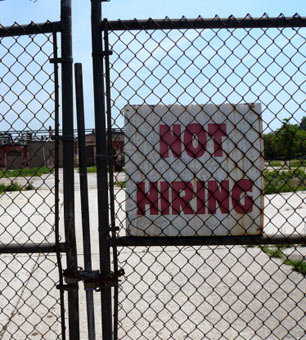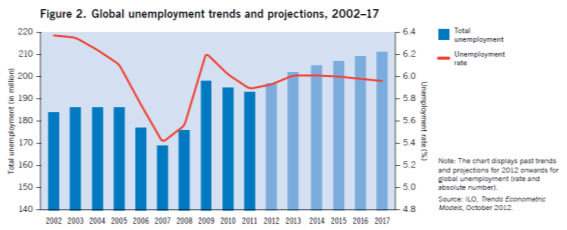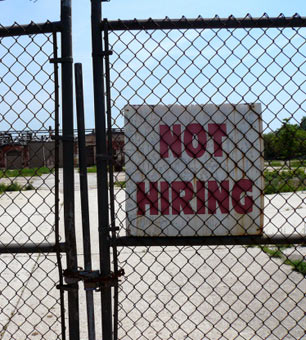 (Photo: WFIU Public Radio / Flickr)After the near collapse of the financial system and the Great Recession, unemployment has significantly increased worldwide. According to the ILO Global Employment Trends 2013 report, a special edition warranted by the global employment crisis, the global unemployment rate is around 6 percent, which translates into a total of 197 million unemployed worldwide – and this number does not include the 39 million who have dropped out of the labor market.
(Photo: WFIU Public Radio / Flickr)After the near collapse of the financial system and the Great Recession, unemployment has significantly increased worldwide. According to the ILO Global Employment Trends 2013 report, a special edition warranted by the global employment crisis, the global unemployment rate is around 6 percent, which translates into a total of 197 million unemployed worldwide – and this number does not include the 39 million who have dropped out of the labor market.
The report estimates that in 2013 the number of unemployed will reach 202 million and in 2013 that number will rise to 205 million. Of these, 73.8 million are young people; the youth unemployment rate is 12.6 percent.

The ILO report points out that:
“[t]he length and depth of the labor market crisis is worsening labor market mismatch, contributing to extended spells of unemployment. As the crisis spreads through international trade, occupations concentrated in exporting industries are particularly vulnerable and in several countries their importance in total employment has declined by significant margins.”
Furthermore,
“Labor force participation has fallen dramatically, in particular in advanced economies, masking the true extent of jobs crisis. The problem is particularly severe in the developed economies and European Union region where the labor force participation rate declined by close to one percentage point and is expected to recede further as long-term unemployment and a weak economic outlook discourages people from staying in the labor market. As a consequence, the employment-to-population ratio has fallen sharply – in some cases 4 percentage points or more – and has not yet recovered even in cases where the unemployment rate has started to decline.”
The situation is worse for the youth:
“Young people remain particularly stricken by the crisis. Currently, some 73.8 million young people are unemployed globally and the slowdown in economic activity is likely to push another half-million into unemployment by 2014. The youth unemployment rate – which had already increased to 12.6 percent in 2012 – is expected to increase to 12.9 percent by 2017. . . Currently, some 35 percent of all young unemployed have been out of a job for six month or longer in advanced economies, up from 28.5 percent in 2007.”
In Europe the situation is particularly severe, as 12.7 percent of all young people are neither employed nor in education or training.
It’s not only the ILO that is focusing on the unemployment crisis these days. The World Bank’s 2013 World Development Report is focused on jobs. While the World Bank wants to promote private sector initiatives for creating jobs, it still has some useful numbers to understand the problem. For example, it estimates that:
“Almost 2 billion working-age adults, the majority of them women, are neither working nor looking for work, but an unknown number of them are eager to have a job…”
The ILO notes that while rising unemployment is putting downward pressure on wages in advanced economies, worldwide, 397 million workers are living in extreme poverty and 472 million cannot address their basic needs. And the World Bank notes that for a great number of workers in poorer countries, the reality is that even holding more than one job and working long hours (often without basic rights and in unsafe conditions), they do not earn enough to provide for themselves and their children.
In short, it is becoming more and more obvious that capitalism does not create enough jobs for the people and when it does create jobs, a great majority of them are not allowing people to secure humane living conditions.
Truthout Is Preparing to Meet Trump’s Agenda With Resistance at Every Turn
Dear Truthout Community,
If you feel rage, despondency, confusion and deep fear today, you are not alone. We’re feeling it too. We are heartsick. Facing down Trump’s fascist agenda, we are desperately worried about the most vulnerable people among us, including our loved ones and everyone in the Truthout community, and our minds are racing a million miles a minute to try to map out all that needs to be done.
We must give ourselves space to grieve and feel our fear, feel our rage, and keep in the forefront of our mind the stark truth that millions of real human lives are on the line. And simultaneously, we’ve got to get to work, take stock of our resources, and prepare to throw ourselves full force into the movement.
Journalism is a linchpin of that movement. Even as we are reeling, we’re summoning up all the energy we can to face down what’s coming, because we know that one of the sharpest weapons against fascism is publishing the truth.
There are many terrifying planks to the Trump agenda, and we plan to devote ourselves to reporting thoroughly on each one and, crucially, covering the movements resisting them. We also recognize that Trump is a dire threat to journalism itself, and that we must take this seriously from the outset.
Last week, the four of us sat down to have some hard but necessary conversations about Truthout under a Trump presidency. How would we defend our publication from an avalanche of far right lawsuits that seek to bankrupt us? How would we keep our reporters safe if they need to cover outbreaks of political violence, or if they are targeted by authorities? How will we urgently produce the practical analysis, tools and movement coverage that you need right now — breaking through our normal routines to meet a terrifying moment in ways that best serve you?
It will be a tough, scary four years to produce social justice-driven journalism. We need to deliver news, strategy, liberatory ideas, tools and movement-sparking solutions with a force that we never have had to before. And at the same time, we desperately need to protect our ability to do so.
We know this is such a painful moment and donations may understandably be the last thing on your mind. But we must ask for your support, which is needed in a new and urgent way.
We promise we will kick into an even higher gear to give you truthful news that cuts against the disinformation and vitriol and hate and violence. We promise to publish analyses that will serve the needs of the movements we all rely on to survive the next four years, and even build for the future. We promise to be responsive, to recognize you as members of our community with a vital stake and voice in this work.
Please dig deep if you can, but a donation of any amount will be a truly meaningful and tangible action in this cataclysmic historical moment.
We’re with you. Let’s do all we can to move forward together.
With love, rage, and solidarity,
Maya, Negin, Saima, and Ziggy
